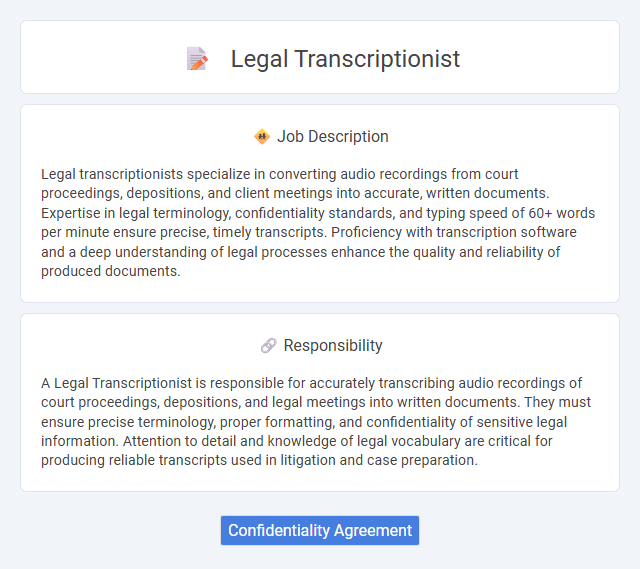
Legal transcriptionists specialize in converting audio recordings from court proceedings, depositions, and client meetings into accurate, written documents. Expertise in legal terminology, confidentiality standards, and typing speed of 60+ words per minute ensure precise, timely transcripts. Proficiency with transcription software and a deep understanding of legal processes enhance the quality and reliability of produced documents.
Legal transcriptionist roles will likely suit individuals with strong attention to detail and excellent listening skills, as accuracy in converting legal audio into written documents is crucial. People who prefer structured, quiet work environments and have proficiency in legal terminology may find this job fitting, while those prone to distraction or discomfort with repetitive tasks might struggle. The probability of success increases for candidates with a background in law or transcription experience, enhancing both efficiency and comprehension.
Qualification
A Legal Transcriptionist must possess excellent listening and typing skills, with a typing speed of at least 70 words per minute and 99% accuracy. Proficiency in legal terminology, court procedures, and document formatting is essential to ensure accurate and reliable transcription. A background in legal studies or relevant certification, such as a Certified Legal Transcriptionist (CLT), enhances job qualifications and employability in this specialized field.
Responsibility
A Legal Transcriptionist is responsible for accurately transcribing audio recordings of court proceedings, depositions, and legal meetings into written documents. They must ensure precise terminology, proper formatting, and confidentiality of sensitive legal information. Attention to detail and knowledge of legal vocabulary are critical for producing reliable transcripts used in litigation and case preparation.
Benefit
Legal transcriptionist jobs probably offer benefits such as flexible work hours and remote work opportunities, which can enhance work-life balance. There is a likelihood of gaining specialized knowledge in legal terminology and procedures, potentially increasing career advancement prospects. Employers might also provide health insurance and retirement plans, contributing to overall job stability and security.
Challenge
Legal transcriptionist roles likely involve challenges such as accurately interpreting complex legal terminology and ensuring precise documentation under tight deadlines. The probability of encountering unfamiliar accents or background noise may increase the difficulty of producing flawless transcripts. Maintaining confidentiality and adhering to stringent legal standards probably adds another layer of responsibility to the job.
Career Advancement
A Legal Transcriptionist can advance their career by gaining specialized knowledge in legal terminology and improving typing accuracy and speed, which opens opportunities for roles such as Senior Transcriptionist or Legal Transcription Supervisor. Mastery of transcription software and familiarity with case management systems further enhance prospects for progression into legal administrative positions or court reporting. Pursuing certifications like the Certified Legal Transcriptionist (CLT) significantly increases employability and potential for higher salaries in the legal transcription field.
Key Terms
Confidentiality Agreement
Legal transcriptionists handle sensitive court proceedings, depositions, and legal documents requiring strict adherence to confidentiality agreements. These agreements mandate secure handling, storage, and transmission of client information to prevent unauthorized access or data breaches. Compliance with confidentiality protocols ensures the protection of privileged information and maintains client trust within the legal industry.
 kuljobs.com
kuljobs.com